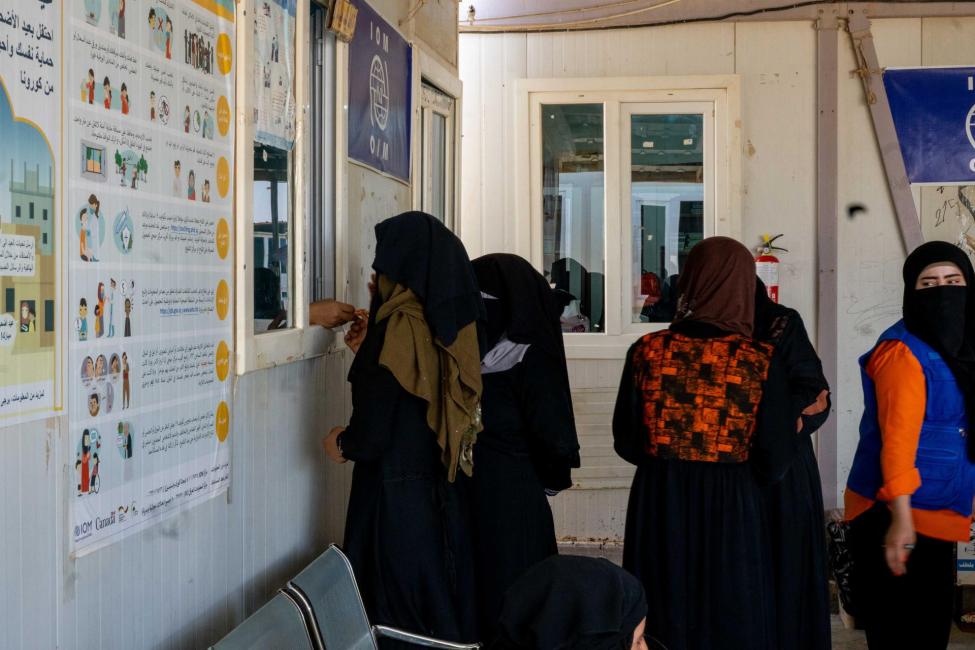-
Who We Are
WHO WE AREThe International Organization for Migration (IOM) is part of the United Nations System as the leading inter-governmental organization promoting since 1951 humane and orderly migration for the benefit of all, with 175 member states and a presence in over 100 countries. IOM has had a presence in Iraq since 2003.
About
About
IOM Global
IOM Global
-
Our Work
Our WorkAs the leading inter-governmental organization promoting since 1951 humane and orderly migration, IOM plays a key role to support the achievement of the 2030 Agenda through different areas of intervention that connect both humanitarian assistance and sustainable development. Across Iraq, IOM provides a comprehensive response to the humanitarian needs of migrants, internally displaced persons, returnees and host communities.
Cross-cutting (Global)
Cross-cutting (Global)
- Data and Resources
- Take Action
- 2030 Agenda
A lot has changed for Asmaa and her family. Life in displacement can be unstable, unpredictable and taxing.
“We were displaced from Rawa district, Anbar Governorate, in 2014 – my husband, children and I. Our journey was difficult and dangerous. We paid a lot of money to get to a safe place,” she says. In 2016, the family eventually made it to Amiriyat al-Fallujah (AAF) camp, where they settled for a difficult couple of years.
“We lived on the aid that came from organizations working in the camp – we got health care through IOM Iraq’s clinic.” Operating in AAF from 2016 until the camp’s closure, the IOM clinic provided primary health care services, including access to vaccinations, family planning and medical consultations.
Not long after their arrival at AAF, Asmaa’s husband passed away, leaving her pregnant and alone, taking care of their five other children. In all the uncertainty they faced, IOM health support has been one of the few constants for Asmaa and her family.
"At the time, I was in the early stages of my pregnancy with my daughter, Najla, who is now 6 years old. I received health care, including follow ups on my health status, medicines and natural birth counseling all the way until Najla came into this world of ours."
When Najla was born with congenital heart disease, she was able to get care via IOM’s AAF health clinic.
“The doctors in the clinic have followed up regularly on my daughter’s health condition and provided her treatment where necessary, up until this very moment,” Asmaa smiles, Najla playing beside her.
Living in displacement means living in flux, including when it comes to health care. Continuity of care is important for health and well-being, and IOM works to maintain that continuity from the moment a patient comes under our care.
"When we decided to return, we got a pre-return medical examination – a comprehensive examination that is expensive to do in private clinics. I also received a paper with all our important medical information to help us during visits to clinics and hospitals in the area we come from and have now returned to," Asmaa explains.
IOM Iraq’s fit-to-travel health assessments– medical examinations undergone by IDPs registered for voluntary return before they leave the camp – aims to ensure that returnees will not face health issues during their return journey. Returnees are also provided with a map of health institutions in their areas of origin that they can access for care.
"We insist that every individual returning to their area undergo a comprehensive medical examination and further analyses for those who need it. For those with acute diseases, we prescribe and provide a week’s worth of medications and treatment, and for those with chronic diseases we provide two months’ worth of medication and treatment. They also have recommendations written in the medical examination form about their medical history. Altogether, this is sufficient to last them until they return to the nearest health centre in their area of origin and continue to receive treatment,” Dr. Amr al-Fayadh, head of IOM Iraq’s clinic at AAF camp.
Since clearing their fit-to-travel health assessment and returning home to Rawa district, Asmaa and her family connected to local health care providers, helping them to rebuild their lives in good health.
“We are so happy to be back,” says Asmaa.
This support was made possible by the U.S. Agency for International Development’s Bureau for Humanitarian Assistance and the Government of Germany.



